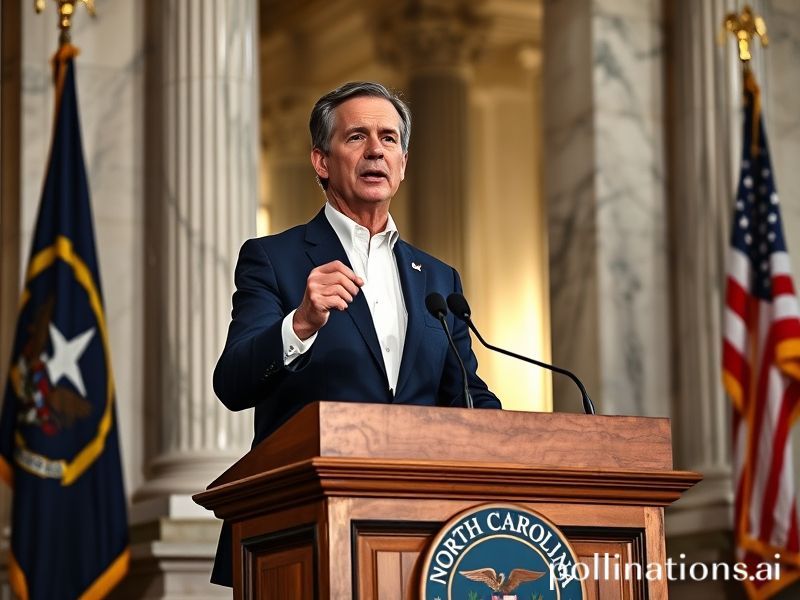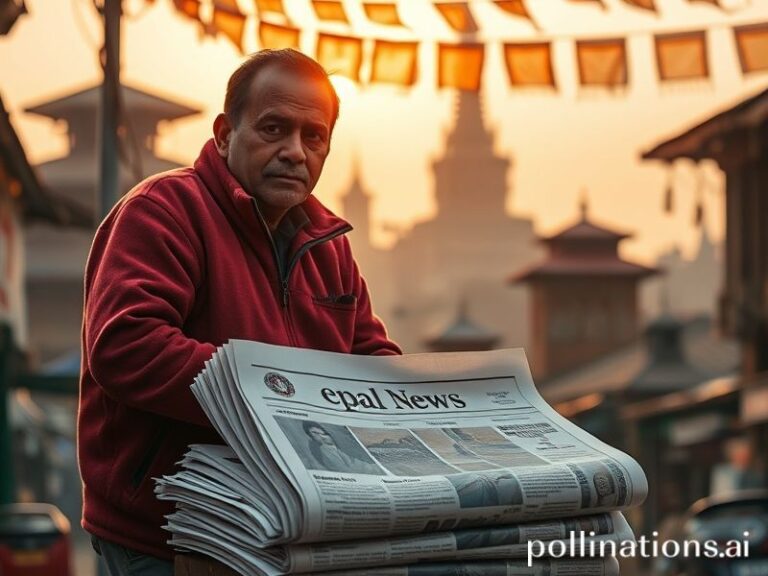Roy Cooper: The World’s Dullest Governor Accidentally Teaching Democracies How to Survive
Durham, North Carolina – In the grand, slow-motion car-crash we politely call “global politics,” it is often the quiet governors of mid-sized U.S. states who remind the rest of the planet how truly provincial the world’s super-power can be. Enter Roy Cooper: a man whose name sounds like an Oxfordshire estate agent but who, since 2017, has ruled over North Carolina with the mild, undentable charisma of a substitute teacher who’s realized the class can’t be controlled and has simply decided to read his newspaper until the bell rings.
To the international observer, Cooper is fascinating precisely because he is so resolutely unfascinating. While Jair Bolsonaro flirts with coups and Emmanuel Macron cosplays as Jupiter, Cooper’s daily brief apparently involves negotiating with a state legislature so gerrymandered it resembles a Picasso drawn by a drunk cartographer. The planet burns, supply chains snap, oligarchs buy Premier League franchises on a whim—yet somewhere between the Blue Ridge and the Outer Banks, the big ideological battle is still whether grown adults may legally inhale a plant that Canadians now purchase beside their morning double-double.
Still, dismissing Cooper as merely parochial is a rookie mistake. North Carolina’s GDP is larger than Ukraine’s pre-war output; its population exceeds that of Libya, a country whose civil war once merited UN Security Council all-nighters. When Cooper quietly strong-arms Apple into building a $1 billion campus near Raleigh, he is, in his own sedate Southern way, redrawing the global semiconductor map that obsesses Brussels and Beijing. If that sounds grandiose, remember that the chips inside your French-designed, Chinese-assembled, American-branded phone were quite possibly etched in a state best known for vinegar-based barbecue and college basketball rivalries so vicious they could teach Gaza a thing or two about entrenched conflict.
Cooper’s signature trick is survival. He is the Democratic governor of a state Joe Biden won by a whisker yet where Republicans hold both legislative chambers—an arrangement that, in most democracies, would produce either paralysis or a coup. Instead, Cooper vetoes, negotiates, and occasionally outfoxes opponents with the enthusiasm of a man folding laundry on a Sunday night. Abroad, politicians promise blood, soil, and 360-degree economic revolutions; Cooper promises “compromise” and somehow keeps getting re-elected. It’s as if the entire electorate collectively shrugged: “He seems harmless enough; let him stay.”
The international implications? Other democracies, exhausted by rabid polarization, now study the Cooper Method™ the way 1990s economists once studied the “Swedish model.” German moderates cite his veto pen when arguing that gridlock can be dignified. Japanese commentators invoke his disaster-management credentials (hurricanes Florence and Helene) as proof that technocrats need not be boring—although Cooper, it must be said, manages to be both. Even the British, scrambling for post-Brexit trade partners, have dispatched envoys to Raleigh, presumably hoping Cooper can teach them how to negotiate with fanatics without looking like a hostage video.
Of course, cynics will note the limits of such moderation. North Carolina still confronts rising seas, stagnant teacher pay, and an opioid death rate that would horrify Moldova. Cooper’s climate plan, while admirably detailed, cannot on its own persuade India to stop burning coal any more than a polite “Mind the gap” announcement will keep Londoners off the tracks. Global problems demand planetary coalitions, not lone technocrats armed with good intentions and a southern drawl thick enough to butter biscuits.
Yet in an era when strongmen tweet policy at 3 a.m. and democracies flirt with electoral arson, the world could do worse than observe a leader who treats Twitter like a hazardous waste site and still believes budgets are for balancing, not burning. Roy Cooper will never trend in Manila, guest-star on a Kazakh talk show, or inspire an art-house biopic titled “The Cooperman Variations.” Still, as democracies from Brasília to Budapest search for antidotes to poisoned politics, they might consider the governor who governs least, tweets least, and somehow keeps his state from catching fire—at least until the next hurricane season, when, like the rest of us, he’ll simply hope the wind blows somewhere else.







